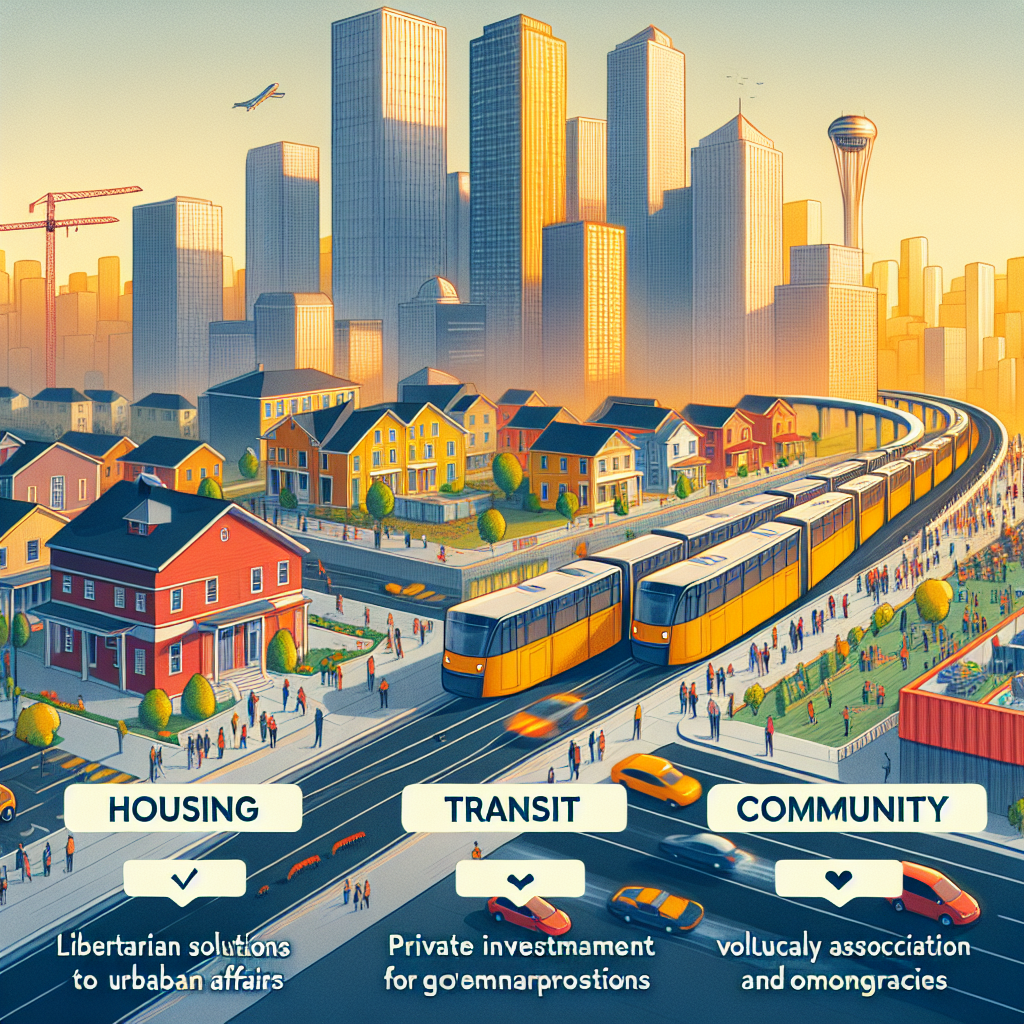Libertarian Solutions to Urban Affairs: Housing, Transit, and Community
Urban areas often struggle with complex issues related to housing affordability, public transit, and community engagement. As cities become increasingly populous, finding effective solutions becomes imperative. Libertarian principles, emphasizing individual liberty, free markets, and minimal government intervention, offer unique approaches that can address these urban challenges. In this article, we will explore libertarian solutions for urban affairs, focusing on housing, transit, and community development.
1. Housing: Creating Affordable Living Spaces
A. Deregulation of Housing Markets
One of the central tenets of libertarianism is the belief in the power of free markets. By reducing regulatory hurdles and zoning laws that restrict housing development, cities can become more accommodating to new construction. Libertarians advocate for easing regulations that limit building heights and the types of homes that can be constructed. By doing so, municipalities can stimulate supply, ultimately leading to a decrease in housing prices and providing more affordable options for residents.
B. Embracing Creative Housing Solutions
Libertarian ideals encourage innovation and entrepreneurship. This philosophy can be applied to housing solutions by promoting alternative living arrangements, such as tiny homes and accessory dwelling units (ADUs). These non-traditional housing methods not only provide affordable options but also increase density without the need for extensive new infrastructure.
C. The Role of Private Property Rights
Strong property rights are key in a libertarian approach to housing. By ensuring individuals can fully utilize and develop their property, cities can foster an environment of investment and improvement. This principle encourages landlords to maintain their properties and offer competitive rates, further benefiting the housing market.
2. Transit: Efficient and Sustainable Solutions
A. Privatizing Public Transit
Libertarians argue that many public services operate inefficiently due to a lack of competition. By privatizing public transit systems, cities can encourage competition, leading to more efficient and customer-oriented services. This approach can enhance service quality and responsiveness while also potentially reducing costs to taxpayers.
B. Embracing Ride-Sharing and Micro-Mobility
Technological advancements in transportation offer alternatives to traditional public transit. Libertarian principles support the development of ride-sharing services and micro-mobility options like scooters and bicycles. By promoting these options, cities can reduce congestion and expand transportation choices for residents without extensive government investment in infrastructure.
C. Infrastructure Investment through Private Partnerships
Libertarians advocate for public-private partnerships to enhance transit infrastructure. By involving private entities in the development and maintenance of transportation networks, cities can leverage efficiencies and innovations that might otherwise be absent in government-operated systems.
3. Community: Fostering Civic Engagement
A. Encouraging Local Governance
Libertarian thought favors decentralized governance, allowing local communities to have a more significant say in their affairs. By empowering local residents and organizations to make decisions, cities can create tailored solutions that reflect the specific needs of their communities. This leads to stronger civic engagement and a sense of ownership among residents.
B. Building Community Through Voluntary Associations
Libertarians emphasize the importance of voluntary associations and community organizations. By fostering a culture where individuals come together for mutual interests, cities can strengthen community ties and encourage collaboration on local projects. Initiatives ranging from neighborhood beautification to social programs can thrive in a collaborative, libertarian framework.
C. Promoting Entrepreneurship and Local Businesses
A flourishing community is often characterized by vibrant local businesses. Libertarians believe in reducing barriers to entrepreneurship, allowing individuals to pursue their business ventures freely. By supporting small businesses and reducing taxes and licensing requirements, cities can cultivate a thriving local economy that benefits everyone.
Conclusion: Implementing Libertarian Solutions in Urban Affairs
Libertarian principles offer a fresh perspective on urban issues such as housing, transit, and community engagement. By advocating for deregulation, privatization, and local governance, cities can foster innovative solutions that enhance the quality of life for their residents. As urban centers continue to grow and evolve, embracing libertarian approaches may lead the way toward more effective and sustainable urban development.
By adopting these solutions, cities can create environments that prioritize individual freedom and economic opportunity, resulting in more prosperous and harmonious urban living for all.
Share this content:












Post Comment